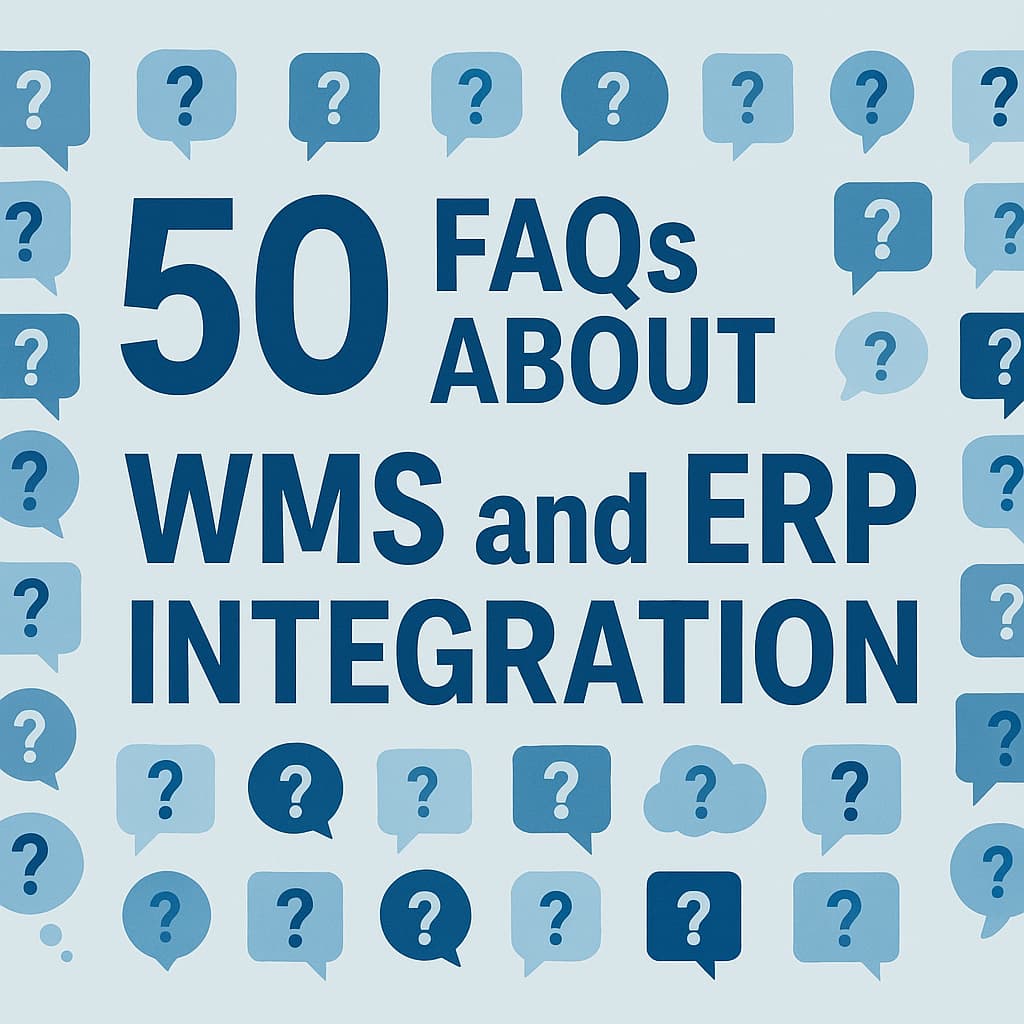50 Essential WMS and ERP FAQs for UK Businesses

Mark Gregory
E-commerce Operations Expert

Navigate the complexities of Warehouse Management Systems (WMS) and Enterprise Resource Planning (ERP) with our comprehensive FAQ guide, tailored specifically for the UK market. From implementation to integration, discover everything you need to know about these essential business systems.
Fundamentals and Basics
In the UK market, a WMS specifically manages warehouse operations, including stock control, picking, packing, and despatch. An ERP system, however, manages broader business processes such as finance, HR, procurement, and supply chain management. While WMS focuses on optimising warehouse efficiency, ERP provides comprehensive business management capabilities compliant with UK regulations and accounting standards.
UK VAT requirements significantly impact WMS and ERP integration, particularly in areas such as:
- Real-time VAT calculation and reporting
- Making Tax Digital (MTD) compliance
- Cross-border transaction management post-Brexit
- VAT-specific inventory valuation
A UK-compliant WMS should include:
- Royal Mail and courier integration
- HMRC-compliant inventory tracking
- UK-specific labelling and documentation
- Post-Brexit customs documentation support
- Integration with UK marketplace platforms
Implementation and Integration
Implementation timelines in the UK typically follow this schedule:
- Small businesses: 3-4 months
- Medium-sized businesses: 4-6 months
- Large enterprises: 6-12 months
- Multi-site operations: 12-18 months
These timelines account for UK-specific requirements such as HMRC compliance, data protection regulations, and integration with local systems.
Key preparation steps include:
- Data cleansing and standardisation
- Staff training programmes
- Process documentation and mapping
- GDPR compliance review
- Legacy system evaluation
Costs and Return on Investment
UK market costs typically include:
- Small business solutions: £15,000 - £50,000
- Mid-market solutions: £50,000 - £200,000
- Enterprise solutions: £200,000+
- Annual maintenance: 15-20% of license cost
- Cloud-based solutions: £100-£300 per user/month
To maximise ROI:
- Implement phased rollout strategies
- Utilise UK government technology incentives
- Focus on process optimisation
- Leverage automation capabilities
- Regular system audits and updates
UK Compliance and Regulations
Key considerations include:
- UK GDPR compliance requirements
- Data storage location restrictions
- Employee data handling procedures
- Customer data protection measures
- Cross-border data transfer protocols
HMRC requirements include:
- Making Tax Digital (MTD) compliance
- VAT reporting capabilities
- Digital record-keeping standards
- Audit trail maintenance
- Real-time information reporting
UK Marketplace Integration
Integration capabilities include:
- Amazon UK marketplace connection
- eBay UK integration
- Multi-channel inventory sync
- Order management across platforms
- Automated fulfilment processes
Best practices include:
- Centralised inventory management
- Real-time stock synchronisation
- Automated order routing
- Channel-specific pricing strategies
- Unified customer service management
Popular ERP Systems in the UK Market
Here are the most widely-used traditional ERP systems in the UK market:
- SAP Business One - Visit Website
Popular among SMEs, offering comprehensive business management - Oracle NetSuite - Visit Website
Cloud-based solution with strong financial management capabilities - Microsoft Dynamics 365 Business Central - Visit Website
Integrated solution with strong Office 365 integration - Sage X3 - Visit Website
UK-based solution with strong manufacturing capabilities - IFS Cloud - Visit Website
Enterprise-grade ERP with strong asset management - Epicor ERP - Visit Website
Industry-specific solutions for manufacturing and distribution - Acumatica Cloud ERP - Visit Website
Modern cloud-based ERP with flexible pricing - SYSPRO - Visit Website
Manufacturing and distribution focused ERP
Popular e-commerce focused platforms in the UK include:
- Linnworks - Visit Website
UK-based multichannel management system with strong marketplace integrations and inventory control - SellerCloud - Visit Website
Comprehensive e-commerce management platform with strong order processing capabilities - Brightpearl - Visit Website
Retail-focused ERP system with strong automation capabilities - Veeqo - Visit Website
UK-based inventory and shipping management platform for retailers - ChannelGrabber - Visit Website
Multichannel e-commerce management software with UK marketplace focus - Tradegecko (now QuickBooks Commerce) - Visit Website
Inventory and order management system with strong accounting integration - StoreFeeder - Visit Website
UK-based multichannel retail management system - Cloud Commerce Pro - Visit Website
UK multichannel management system with strong courier integration
Note: These platforms often offer specialized features for e-commerce businesses, including marketplace integrations, order management, and shipping solutions specific to the UK market.
Consider these key factors when selecting an ERP system:
- UK compliance and regulatory requirements
- Industry-specific functionality
- Integration capabilities with existing systems
- Total cost of ownership (TCO)
- Implementation timeline and support
- Cloud vs on-premises deployment
- Scalability for future growth
- Local support and partner network
- Marketplace integration requirements
- UK shipping carrier integrations
Need Expert Guidance?
Book a consultation to discuss your specific WMS and ERP integration needs for the UK market.
Book a Free Consultation